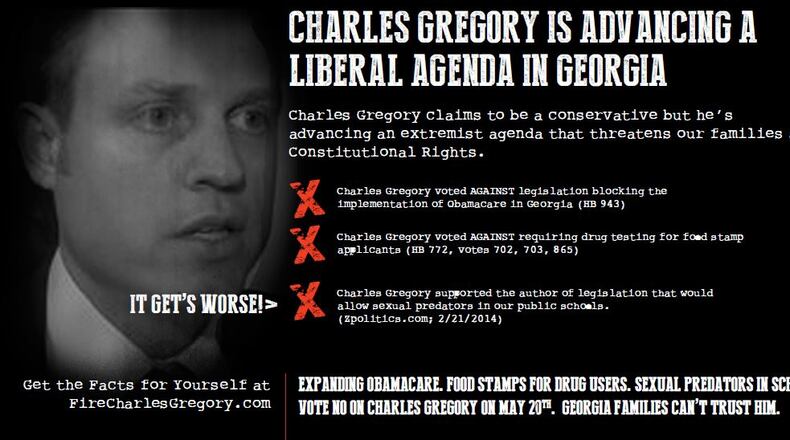This winter, the state Capitol erupted in a sudden and unexpected fight over a set of "religious liberty" bills that were interpreted as a hostile reaction to the ground that gay marriage has gained through the courts.
Tea party supporters sought protection for the Christian wedding photographer who, out of conscience, refuses to snap pictures of a same-sex couple exchanging vows.
But Georgia’s corporate giants saw something else: Legislation that would open their businesses to boycotts and lawsuits, trapping them in unwanted disputes perhaps generated by their own workers – the UPS driver who won’t deliver a package to a gay bar, or the flight attendant who won’t pour coffee for a honey-mooning lesbian couple.
Led by Atlanta-based Delta Air Lines, business heavyweights quickly announced their opposition to the bills. Which were summarily withdrawn or buried, to howls of frustration from the GOP’s right flank.
“When it came to protecting one of the reasons this nation was formed, [GOP leaders] caved to pressure from corporate lobbyists and the left,” a fuming Julianne Thompson of Atlanta Tea Party Patriots said at the time. She pointed specifically to the "Hobby Lobby" portion of the Affordable Care Act that requires employers to include coverage for contraception in health insurance packages.
Thompson vowed that the “religious liberty” movement would return next year. And Georgia business leaders apparently believed her.
The biggest secret of this election season has been the sudden formation of a statewide, independent campaign to oust some of the most extreme – participants would say anti-business – members of the Legislature. And lend support to those viewed as more friendly. Financial data has only become available in the last few days.
Formed shortly after the Legislature adjourned in March, and still barely a month old, the Georgia Coalition for Job Creation has already raised north of $350,000.
Massive checks have been written: Nearly $100,000 from Georgia Chamber of Commerce entities, $50,000 each from Coca Cola, Delta, Georgia Power, AT&T, and $25,000 from Newell Rubbermaid, Home Depot and SunTrust.
Leery of being pegged as agenda-driven, the leaders of two groups behind the effort would respond only with heavily circumspect, emailed statements.
“[W]e cannot afford to sit on the sidelines. It is our responsibility to engage and to support those individuals who will make a positive impact on our economy,” said Chris Clark, president and CEO of the Georgia Chamber.
“Our leaders are very focused on the economic future of this state. They understand the importance of nominating leaders in both parties’ primaries who are committed to creating jobs and, more importantly, know how to get it done,” wrote Hala Moddelmog, president and CEO of the Metro Atlanta Chamber.
Both referred the curious to Scott Paradise, a Marietta political strategist in charge of coalition logistics. “We had no litmus test to determine our support, nor was there any single issue that encouraged us to support or oppose a candidate,” Paradise said. Also via email.
One lobbyist involved in the creation of the committee, speaking in private, was more blunt. “We’re not going to let liberty Republicans throw business out of the Republican party,” the lobbyist said.
The coalition is playing in a dozen or so races, including some Democratic ones. At least three House Republican incumbents have been targeted for elimination: state Rep. Charles Gregory of Kennesaw; Sam Moore of Ball Ground; and Jason Spencer of Woodbine. All three have opposition with whom, according to the rules, the business coalition can’t coordinate.
In his first term, Gregory has introduced some of the most aggressive gun rights legislation seen in the General Assembly. “It’s big business trying to buy government,” said the Kennesaw lawmaker. “They’re propping up their business interests over everybody else’s.”
Moore took office mid-session this year, and was almost immediately slapped down for introducing a bill that would have banned anti-loitering laws and ended restrictions that keep child molesters away from schools and playgrounds.
Spencer was the author of HB 707, a bill that originally would have barred the state insurance commissioner from enforcing Obamacare. For instance, the ban on using pre-existing conditions to refuse coverage.
The bill passed, but only after being stripped of most of its teeth.
The coalition is also coming to the defense of some incumbents, including Brooks Coleman of Duluth, chairman of the House Education Committee – which this year killed a bill that would have required the state school system to withdraw from Common Core, the voluntary standards system that many Republicans condemn as an attempt to federalize education.
The Georgia Chamber is very much behind Common Core.
The coalition is choosing its targets carefully. Perhaps recognizing that primary runoffs will require a great deal of cash as well. Or the group may be following that ancient Chinese tactic: “Kill a chicken to scare the monkeys.” Translated into English, that means targeting more vulnerable targets in order to send a message to more entrenched lawmakers.
The coalition has apparently not set its sights on state Sen. Josh McKoon, R-Columbus, or state Rep. Sam Teasley, R-Marietta, who introduced the two religious liberty bills that provoked business concern.
Nonetheless, McKoon called the effort unhelpful. “To the extent that the business community becomes hostile to basic issues and constitutional freedoms like religious liberty – that deviates from its basic message of economic development,” he said. “I don’t think it’s a very constructive enterprise.”
About the Author
The Latest
Featured




